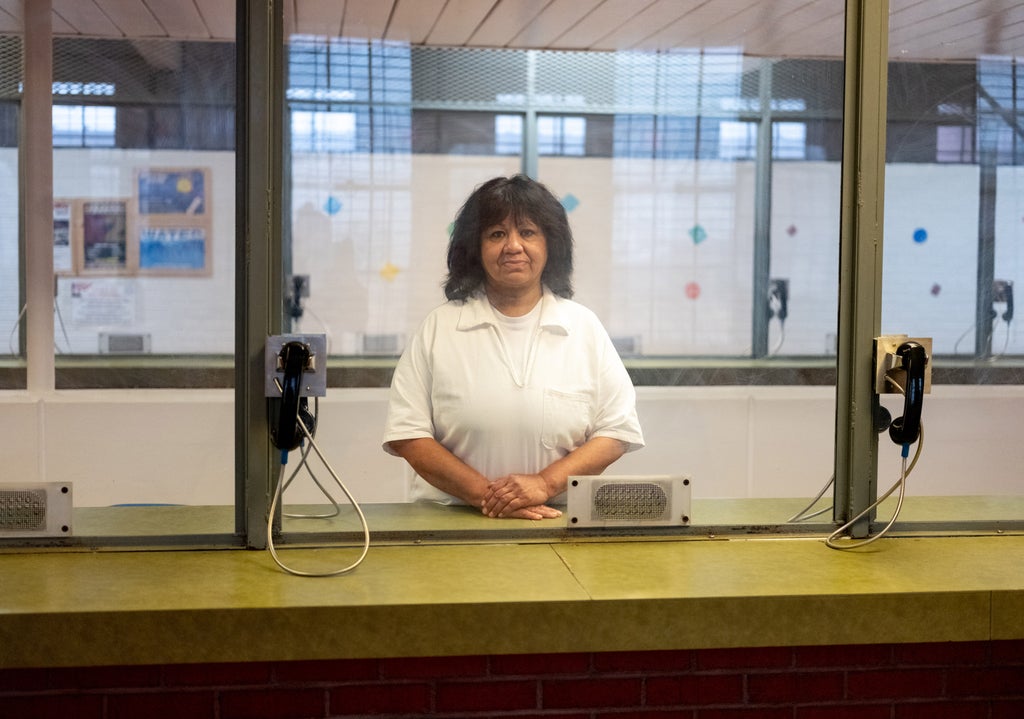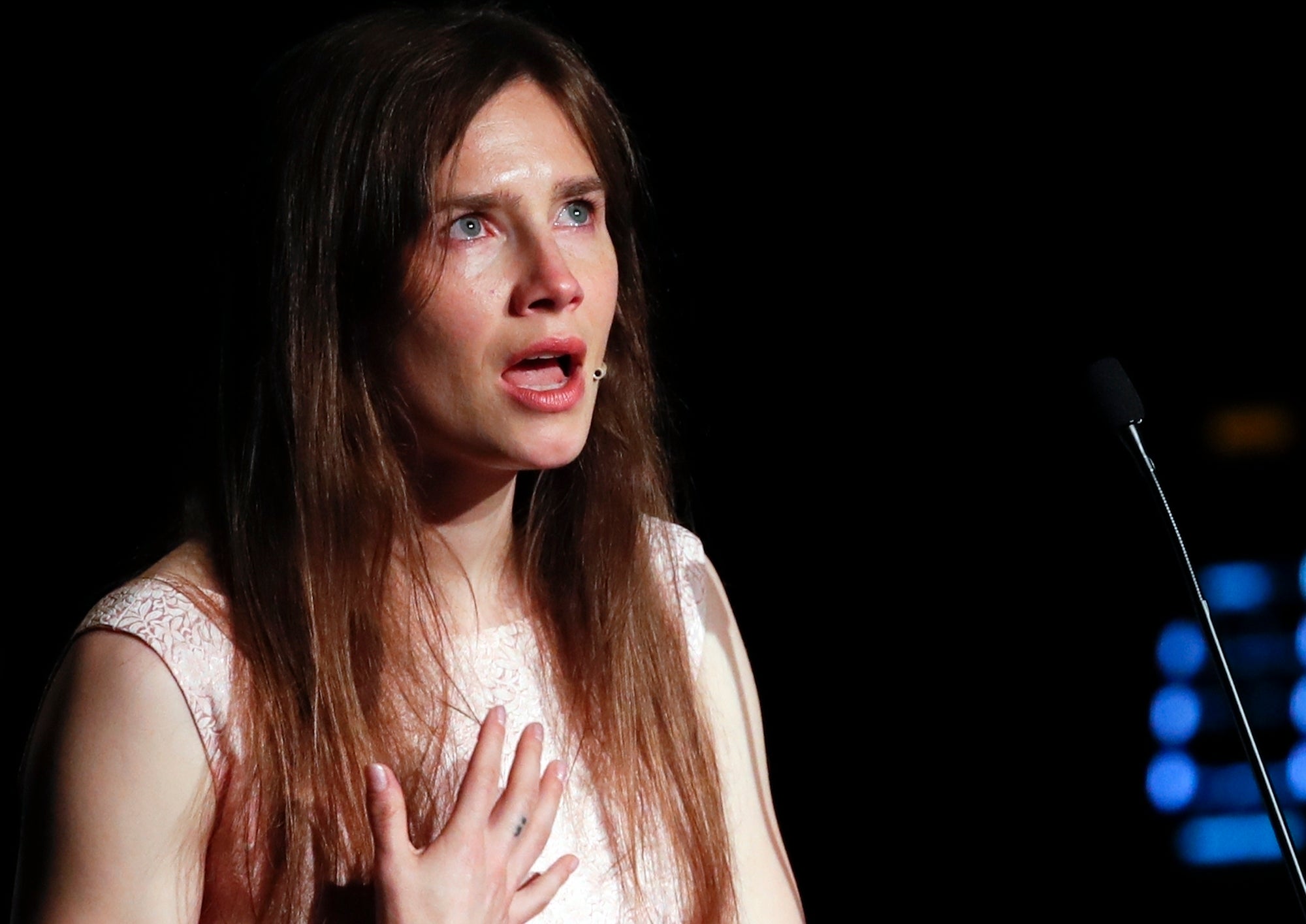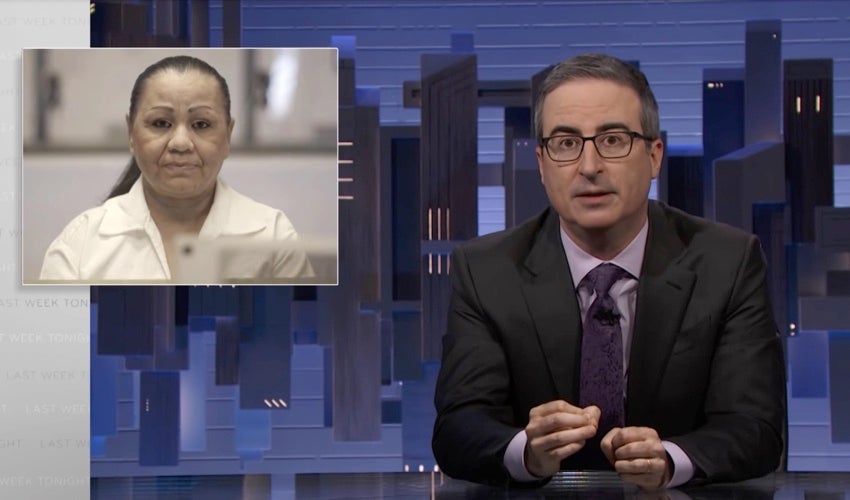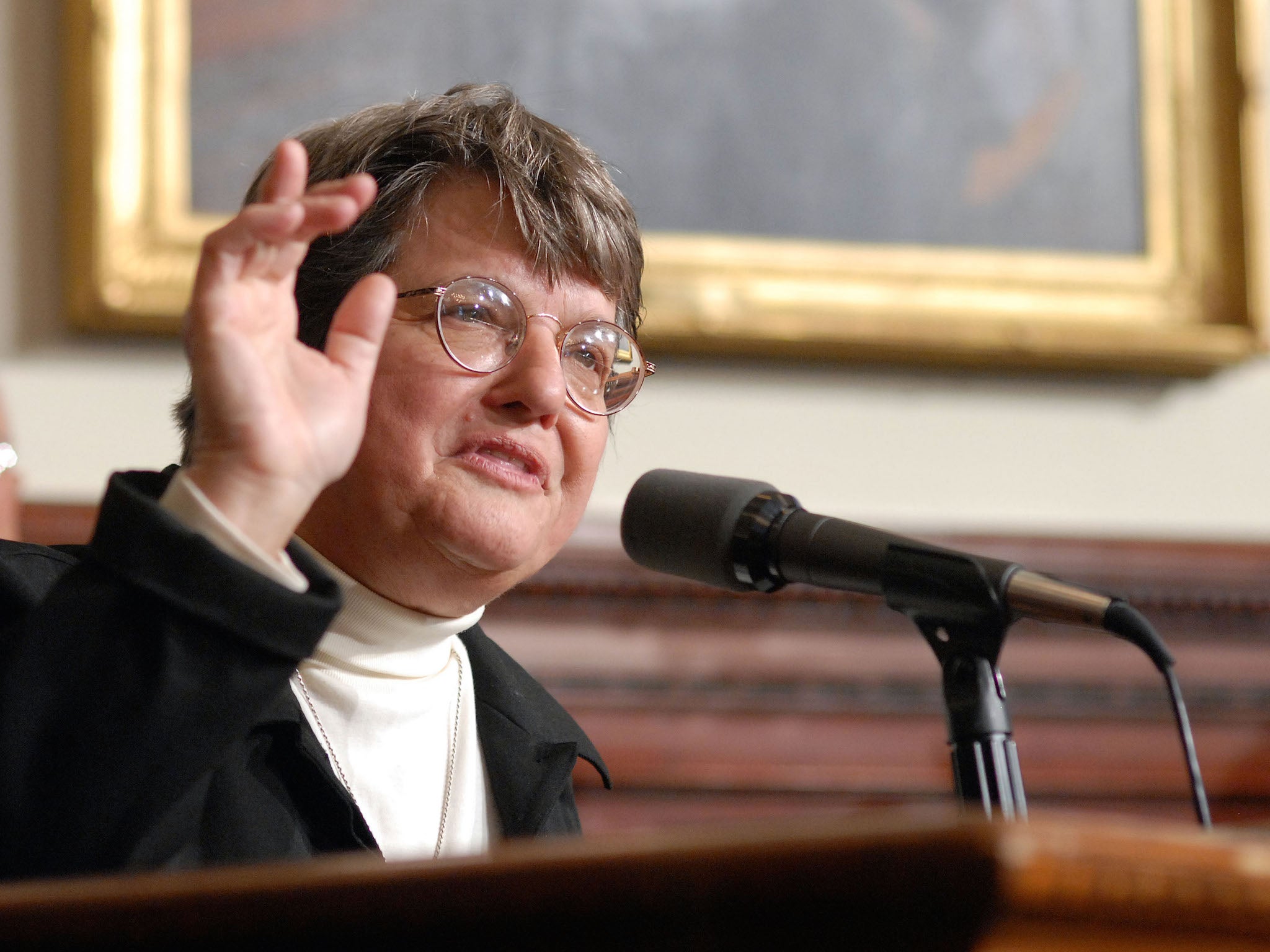
The Texas Board of Pardons and Paroles is expected to decide today whether the state should move ahead with the execution of Melissa Lucio, a Hispanic mother-of-14 who has spent 13 years on death row for a crime she says she didn’t commit.
The parole board is considering Lucio’s case on Monday to determine if her death sentence should be commuted to life in prison or if she should be granted a 120-day reprieve from execution.
Once the board reaches a decision, Governor Greg Abbott will then have the power to decide whether or not to act on any recommendation.
The 11th hour hearing comes just two days before Lucio is scheduled to be put to death on Wednesday 27 April for the 2007 murder of her daughter Mariah.
Lucio, a victim of lifelong domestic violence, was sentenced to death in 2008 after prosecutors claimed the two-year-old died from her mother physically abusing her.
For the last 14 years, Lucio has insisted she is innocent – and that no murder even took place – with her daughter sadly passing away from injuries caused by a fall down a flight of stairs two days earlier.
Her attorneys say that a “coerced false confession” was used to convict Lucio after the pregnant, grieving mother was “manipulated” in an aggressive five-hour interrogation by police officers in the hours after her daughter’s sudden death.
Crucial expert testimony for the defence was also excluded from her trial while false scientific evidence of the child’s injuries was presented to the jury and Lucio was subjected to gender bias from the get-go, according to her legal team.
All of Lucio’s surviving children have begged Texas authorities not to kill their mother.
It’s a case that has drawn outcry from celebrities, public figures and state lawmakers on both sides of the political aisle, with calls mounting for her execution to be halted.
Here are some of the famous names who are fighting to save the life of the only Hispanic woman on death row in Texas:
Kim Kardashian
Kim Kardashian drew national – and even global – attention to Lucio’s plight in early April by tweeting about the case to her 72.1m followers.
On 7 April, she shared a “heartbreaking” letter signed by the Texan mother’s children begging for her life to be saved.
The reality TV star told her followers that there are many “unresolved questions” around Lucio’s case, saying it is one of “many” reasons why she opposes the death penalty.
“So heartbreaking to read this letter from Melissa Lucio’s children begging for the state not to kill their mother. There are so many unresolved questions surrounding this case and the evidence that was used to convict her,” she tweeted.
“This is one of the many reasons why I am against the death penalty - and why I pray her children’s wish is granted and their mother’s life is spared.”
Her original tweet has gained more than 5,867 likes and 860 retweets.
The letter from Lucio’s children begged Texas Governor Greg Abbott and the Texas Board of Pardons and Paroles to give the family a chance of “closure” by sparing their mother’s life after they already lost their sister and had their parents taken from them when they were convicted over her death.
“We ask you to spare the life of our mother, Melissa Lucio. We ask you for closure. We ask you for peace,” it reads.
“The death of our sister Mariah and the prosecution of our parents tore our family apart. The wounds never fully healed. They probably never will.
“We ask you not to tear those wounds open again. Please give us the chance for closure. Please give us a chance for peace. Please allow us to reconcile with Mariah’s death and remember her without fresh pain, anguish, and grief.”

Kardashian, who passed the baby bar exam last year, has become a vocal opponent of the death penalty and has rallied behind other cases where the inmate’s guilt was called into question.
Last year, she drew attention to the case of Julius Jones who was scheduled to be executed in Oklahoma for a 1999 murder he said he didn’t commit.
In November, Jones was granted clemency by Governor Kevin Stitt.
Amanda Knox
Amanda Knox joined in calls to stop Lucio’s execution last week, comparing the conviction of the mother of 14 for the murder of her two-year-old daughter Mariah to her own wrongful conviction in Italy for the murder of her British roommate Meredith Kercher.
Ms Knox shared a Medium post about Lucio’s case on 19 April – just one week away from the execution date – saying that she wishes she could “welcome her into our exoneree family”.
She spoke about both of their experiences of motherhood and hit out at the different treatment of men and women within the criminal justice system as she said real justice would not only be saving Lucio from execution but “an exoneration and immediate release from custody”.
Ms Knox, who regularly speaks out about wrongful convictions following her own exoneration, wrote that accidents can be “a rite of passage” of motherhood, describing a moment where her daughter Eureka fell from a couch and she felt “like the worst mother in the world”.
She said that her experience is one many parents go through with no lasting impact to the child or the parent “unless you’re Melissa Lucio”.
“It’s a rite of passage, I learned, the first time your child falls, that first moment of parental negligence, that first jolt of unexpected pain that shocks them (and you) into tears,” she said.

“But an hour later, they’re okay and you’re okay, and life goes on. Unless it doesn’t.
“Unless you’re Melissa Lucio, whose daughter died from just such an accident, whom the state of Texas plans to execute on April 27th for a crime that never even occurred.”
Ms Knox went on to highlight the differences between men and women who are wrongfully convicted of crimes.
“When men are wrongfully convicted, there’s usually an obvious crime, blood and trauma, a grieving victim’s family. The police and prosecutors just got the wrong person, and somewhere out there, the real rapist or killer may be causing more harm,” she wrote.
“But when women are wrongfully convicted, in nearly 70 per cent of cases it’s for crimes that never occurred — deaths by accident, disease or suicide, and in nearly a third of cases, it’s for the deaths of their own children or children in their care.
“With women, most often, the grieving family is their own.”
She also pointed to the prevalence of false confessions, particularly among those who are vulernable.
“In my case, I was 20, alone in a foreign country, thousands of miles from home, being interrogated in a foreign language. My roommate had just been senselessly and brutally murdered, the killer was on the loose, and I had no one to turn to for help,” she said.
“No one but the police. And over 53 hours in five days, they broke me.”
In Lucio’s case, she was especially vulnerable after suffering a lifetime of sexual and physical abuse at the hands of men, said Ms Knox.
“After five hours of psychological abuse, Melissa Lucio did what many people do in that situation: she said whatever they wanted her to say to get out of that room,” she wrote, adding that her escape from her latest abusive relationship was “into the abusive arms of the state of Texas”.
The “more vulnerable they are, the easier it is for police” to elicit a false confession, explained Ms Knox, admitting that she understands that many people think “‘I would never confess to something I didn’t do’”.
“I certainly thought that before I found myself in an interrogation room,” wrote Ms Knox.
Ms Knox was a 20-year-old Seattle college student on placement in Perugia, Italy, in 2007 when her British roommate Ms Kercher was brutally sexually assaulted and murdered in their apartment.
Ms Knox and her then-boyfriend Raffaele Sollecito were charged and convicted of her murder and spent four years in prison, before being acquitted and released on appeal.
The pair were then convicted of Ms Kercher’s murder again before finally being exonerated by Italy’s Supreme Court in 2015.
Meanwhile, a known burglar Rudy Guede was arrested and convicted of Ms Kercher’s murder.
Following Ms Knox’s release and return to the US, she said she attended the annual Innocence Network Conference with her mother and two men ran up to her telling her “‘you don’t have to explain a thing, little sister. We know.’
“By the end of that weekend, I had a new family,” she wrote.
Ms Knox wrote that she wishes she could hug Lucio and “do the same” for her.
“I wish I could do the same for Melissa Lucio,” she said. “I wish I could meet her on the other side of those double doors in a hotel ballroom and welcome her to our exoneree family, and say, ‘You don’t have to explain a thing, sister. We know.’”
John Oliver
Back on 6 March, comedian John Oliver dedicated part of his HBO talk show “Last Week Tonight” to Lucio’s case in a segment where he spoke of how difficult it is to overturn a wrongful conviction.
He said Lucio’s conviction and death sentence was a prime example of the “maddening” criminal justice system, saying that after she “went through the most horrific thing imaginable” of her daughter’s sudden death she was then “pushed” by law enforcement to confess to her murder.
Mr Oliver shared a clip from the 2020 Hulu documentary “The State of Texas vs. Melissa”where Lucio spoke of the “very vulgar, very rough, very persistent” interrogation.
He pointed to issues in the trial and also in her appeal where she was denied a new trial despite the courts agreeing that if jurors had heard expert testimony that was denied at her trial they could have reached a different verdict.
He shared a clip in which former Cameron County Assistant District Attorney Alfredo Padilla said Lucio has “nobody to blame but herself” for her looming death sentence.

Mr Oliver hit back saying that the fault is “not hers” but “the cops who badgered her, the Texans who voted for a governor who seems unwilling to intervene… and you [Padilla] for prosecuting based on a confession that wasn’t even a confession”.
“With a system so fundamentally f***ed what do we do?” asked Mr Oliver.
The comedian called for greater fairness in the criminal legal system, saying that the current system views people as “essentially guilty until proven rich or lucky”.
“We cannot keep letting the most vulnerable be casualties of a system that cares more about quick and final decisions than actually correct ones,” he said.
Sister Helen Prejean
Sister Helen Prejean, the Catholic nun who wrote the iconic book Dead Man Walking, has tweeted about Lucio’s case to her 174,000 followers, saying that “psychological pressure and coercion” led the grieving mother. to “admit to things that never happened”
On 6 April, Sister Helen shared an op-ed written by false confession expert Gisli H. Gudjonsson for The Independent about Lucio’s case.
She wrote: “Melissa Lucio was interrogated by investigators trained to extract confessions, not to find the truth.
“When psychological pressure and coercion are applied with clinical precision, people buckle and admit to things that never happened.”

On April 11, Sister Helen shared more details of Lucio’s case with her followers describing the “tragic accident” that led to her daughter’s death and the “five hours of coercion” that caused her to make a “false confession”.
“Melissa Lucio’s daughter, Mariah, died in a tragic accident. Within hours, police took Melissa into a small room. They yelled at her, threatened her, and showed her photos of Mariah’s body. After five hours of coercion, Melissa made a false confession,” she tweeted.
“Detectives shouted at Melissa, berated her for being a neglectful mother, and implied that if Mariah’s death was not her fault then it had to have been one of her other children. They promised to help her and said they would let her attend Mariah’s funeral if she confessed.
“The purpose of the interrogation was not to get to the truth. The investigators were only interested in using psychological pressure and manipulation to obtain evidence that supported their pre-conceived theories. This type of tunnel vision is very dangerous in criminal cases.”
Sister Helen famously penned the 1994 book Dead Man Walking: An Eyewitness Account of the Death Penalty in the United States after becoming the spiritual advisor to two men on death row - Patrick Sonnier and Robert Lee Willie - in the 1980s. She witnessed the executions of both men.
Following their deaths - and at a time when national support for the death penalty was at an all-time high - the Catholic nun released her book, sparking a nationwide debate about capital punishment.
The book famously inspired a Hollywood movie of the same name starring Susan Sarandon and Sean Penn.
Over the last few decades, Sister Helen has campaigned for the abolition of the death penalty and pushed the Catholic Church to condemn the death penalty in all circumstances.
The Independent and the nonprofit Responsible Business Initiative for Justice (RBIJ) have launched a joint campaign calling for an end to death penalty in the US. The RBIJ has attracted more than 150 well-known signatories to their Business Leaders Declaration Against the Death Penalty - with The Independent as the latest on the list. We join high-profile executives like Ariana Huffington, Facebook’s Sheryl Sandberg, and Virgin Group founder Sir Richard Branson as part of this initiative and are making a pledge to highlight the injustices of the death penalty in our coverage.







